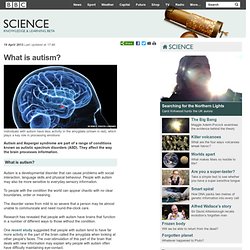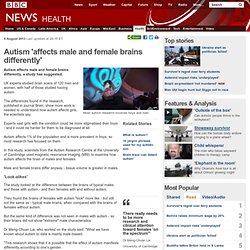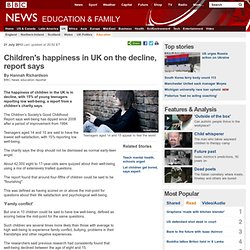

BBC Science - What is autism? 19 April 2013Last updated at 17:40 Individuals with autism have less activity in the amygdala (shown in red), which plays a key role in processing emotions Autism and Asperger syndrome are part of a range of conditions known as autistic spectrum disorders (ASD).

They affect the way the brain processes information. Autism is a developmental disorder that can cause problems with social interaction, language skills and physical behaviour. People with autism may also be more sensitive to everyday sensory information. To people with the condition the world can appear chaotic with no clear boundaries, order or meaning. The disorder varies from mild to so severe that a person may be almost unable to communicate and need round-the-clock care. Research has revealed that people with autism have brains that function in a number of different ways to those without the condition. Specific nerve cells in the brain, called neurones, also act differently in people with autism. Autism 'affects male and female brains differently' 8 August 2013Last updated at 20:15 ET Most autism research involves boys and men Autism affects male and female brains differently, a study has suggested.

UK experts studied brain scans of 120 men and women, with half of those studied having autism. The differences found in the research, published in journal Brain, show more work is needed to understand how autism affects girls, the scientists say. Experts said girls with the condition could be more stigmatised than boys - and it could be harder for them to be diagnosed at all. Autism affects 1% of the population and is more prevalent in boys, so most research has focused on them. In this study, scientists from the Autism Research Centre at the University of Cambridge used magnetic resonance imaging (MRI) to examine how autism affects the brain of males and females. Male and female brains differ anyway - tissue volume is greater in males. 'Look-alikes' Continue reading the main story “Start Quote End QuoteDr Meng-Chuan LaiUniversity of Cambridge.
Brave new work: Making the 9-5 somewhere you want to be. 11 July 2013Last updated at 18:54 ET By Fiona Graham Technology of business reporter Working 9-5: If you start counting the clock from the moment you slump behind your desk you're not alone - 70% of US workers, and many many more people around the world are right there with you Are you happy at work?

If that seems like a loaded question - can you at least say you're interested in what you're doing, and feel motivated? If the answer is no, don't worry. You're not alone. So what can we do about it? Break clause Dave Coplin has a few ideas. He is Microsoft UK's chief envisioner. It's something he's passionate about, and that comes across clearly in his new book Business Reimagined: Why work isn't working and what you can do about it. Dave Coplin believes for companies to thrive they need to change the way their employees work "Fundamentally I think work isn't working," he says. Children's happiness in on the decline, report says. 21 July 2013Last updated at 20:52 ET By Hannah Richardson BBC News education reporter Teenagers aged 14 and 15 appear to feel the worst The happiness of children in the UK is in decline, with 15% of young teenagers reporting low well-being, a report from a children's charity says.

The Children's Society's Good Childhood Report says well-being has dipped since 2008 after a period of improvement from 1994. Teenagers aged 14 and 15 are said to have the lowest self-satisfaction, with 15% reporting low well-being. The charity says the drop should not be dismissed as normal early-teen angst.
About 42,000 eight to 17-year-olds were quizzed about their well-being using a mix of extensively trialled questions. The report found that around four-fifths of children could be said to be "flourishing". This was defined as having scored on or above the mid-point for questions about their life satisfaction and psychological well-being.
How Positive Thoughts Build Skills, Boost Health, and Improve Work.